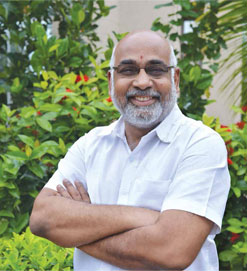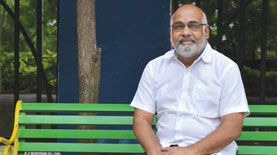
From being a Sergeant in the Indian Air Force with an expertise in ground defence equipment to becoming the founder owner of Aditya Group, VRB Krishnamurthy has had a varied experience. In his interview with Corporate Citizen, he maps the milestones in his journey
I retired from the Indian Air Force in 1993 and joined my uncle who had a transport business. His office was in Mumbai and he was finding it difficult to get a person who could speak in Tamil as well as in Hindi. That’s why he asked me to join him. Mumbai was a dream place for me - the busiest place with plenty of opportunities. So I worked with him for three years, after which he decided to wind up his business. So, I started on my own in 1996, with a single vehicle and an initial capital of Rs.1, 24,000. Eventually, we were able to take a bank loan and expand. I focussed on road bitumen transport in Mumbai. Within a decade, we spread out, across the country. We reached the No.1 position in bitumen transport in the country with 125 own vehicles with 10 Branches across the country. Our business group is called Aditya Group. The bitumen transport company is Aditya Logistics India Pvt Ltd.
During our peak period we had turnover of Rs.100 crore as a group including the logistic, IT, Medical equipment Trading and AMW Dealership.
I come from a remote village in Tiruchirappalli (Trichy) district. My father was the headman there. My brother was amongst the few youngsters to go out of the village to pursue his college studies. I studied in Tamil medium school in our village from I-V Std. After that, I studied in the same boarding school where my brother was until Std. XI. Then I did my technical course. While studying, I was in the National Cadet Corps (NCC). That was where I got the idea of joining the Indian Air Force. My brother was also my inspiration as he joined the Air Force before me. I was recruited as Air Craftsman.
I worked with the Indian Air Force for 15 years. In the last five years of my service, I worked under the Ministry of Defence at ADGES(Air Defence Ground Environment System, Bangalore). We were trained in French Radar equipment and the Indian Doppler Radar (INDRA) which was the first Indian radar, developed by the Indian Government BEL, Ghaziabad in association with the Defence Research and Development Organisation (DRDO). I was an Instructor for Ground Equipment Radars where I was teaching both officers and men. My initial contract with the Indian Air Force was for 15 years, after which I took voluntary retirement.
In the Air Force, there is no caste or creed and everybody is together. You know that red blood that flows in the veins of everyone is the same; only the blood group is different. So there is unity and team spirit - VRB KRISHNAMURTHY
In the Air Force and all other defence services, discipline comes first and foremost. It runs in our blood. Even today when I get up from a chair, I see to it that it is put back properly. We are also taught that nothing can be achieved without hard work and we are trained to be systematic in everything that we do.
In the Air Force, there is no caste or creed and everybody is together. You know that red blood that flows in the veins of everyone is the same; only the blood group is different. So there is unity and team spirit. Everybody is equal out there. This teaching of equality and unity is deeply entrenched in our subconscious. Therefore, if you observe, ex-servicemen perform extremely well even after retirement.
Unfortunately, the civil community is unable to reconnect with ex-servicemen, especially those of junior ranks. The number of officers is small in number. So, they get the preference and are appointed as HR heads and in other areas as well. However, personnel of other grades do not get such opportunities though they are far more capable than their civilian counterparts. For example, people are studying today what I studied in the in the Air Force in hardware of a computer, some 15 years ago. The defence technology is so good and advanced. Whether it’s the Army, Navy or the Air Force, the technology is very superior. However, ex-servicemen remain unutilised. It was the same with me when I retired. There was no opportunity for me outside.

I took early retirement because I was keen on starting an enterprise, in order that I can contribute something back to the society and also grow to a bigger level. That was my intention. But when I came outside, it was a totally difficult world. I could not get a single rupee of bank loan because I am an ex-service man. I was told that I can avail of a loan only if I give collateral. Being in the defence forces, you are away from your near and dear ones and your friends for 15 years, so nobody comes to your help. You have to be on your own. I tried doing some small business but it did not work out, so I was compelled to join my uncle in his transport business.
Mr Vajpayee was the Prime Minister then and he had ambitiously launched the Golden Quadrilateral Project. So, I thought there was an opportunity. We concentrated on both quality and quantity, to carve a niche for ourselves. From bitumen transport business, we started trading in it too.
The first teething problem was that the trade was filled with a lot of corruption and malpractices. We tied up with an oil company and a contractor. It is a tri party agreement. In it, the buyer buys bitumen directly from the oil companies and the transporter does the ferrying. What we did was to assure the contractor who wanted to buy the bitumen that we would provide dedicated quality and quantity service. Oil companies also vouched for us. That made it a tri party agreement. We did a lot of projects this way.
Maintaining the quality was the main problem due to malpractices and secondly none of the transporters had expanded at all India level. We were the only transporter to do so and also the first transporter with 100 plus vehicles. We were the first transporter to seal the bitumen Tankers to avoid shortages and mixing of other products. We are also the first ones to get the ISO certification.
The corruption mainly involved the drivers themselves trying to deal with road side buyers. We made sure that drivers are taken care of; we started paying commission other than salaries. We motivated them by giving yearly bonus. A driver completing five years with us would be given a gold chain or some other jewellery. We also took care of education for their children - mainly we treated the staff and drivers as good human beings and gave all privileges’ like staff of our other Group Companies.
It is called the Prodigy Informatics Pvt Ltd. We have been developing software for hospital management. There were difficulties in that too. We got the first order for hospital management solution from Maharashtra. It was to be used on trial basis in Mumbai but the person who gave the order got blacklisted for some political reason. Because of that, our order got plugged. That caused shortfall of business.
In a job, one needs to take care of only his family but if he does business, he can take care of unlimited number of families. At the end of the day, you are content and go to sleep thinking you have given an opportunity to so many people-VRB KRISHNAMURTHY
We import surgical operating microscopes and sell them. The government has brought in an order that the equipment is not compulsory for Post Graduate Medical colleges. So we were not able to sell the high cost equipment. That’s another setback we had.
My son, Adityakrishna Murthy has completed his studies from Symbosis, Pune and has joined me in the business He wants to expand the business in Transport & Logistics. So, we are refocusing only on Bitumen & other black oil product transportation and providing logistic solutions to Road, Airport, Developers, Steel and Power Plants.
We are trying to work the earlier tried and tested model that is to have more owner-cum-driver’ vehicles and promote them as entrepreneurs and keep the market with us, by giving good service. As the new government is focussing on roads, it will be possible to bounce back by 2020 to our original position.
It was a great day, when our new Corporate office was inaugurated after 10 years of business. I could get the opportunity to bring my beloved school teacher who taught me upto Std V and my respected headmaster Fr. V Antonysamy. Here I must mentioned that Father had helped me during my Std VIII studies by giving me three month credit for the hostel Fees of `35 per month by breaking the rules. I am eternally indebted to him.
Even though I have seen ups and downs I recommend one should opt for business. In a job, one needs to take care of only his family but if he does business, he can take care of unlimited number of families. At the end of the day, you are content and go to sleep thinking you have given an opportunity to so many people. These are the things you feel proud about.
Live a simple life. What is required for you is simplicity. Money comes and goes; fame comes and goes. But when you leave this body and leave this world, you must be a role model for the next generation. That’s it.
I have been successful in my core business but when I went for expansion, I could not control it properly. The finance and the timing matters. You should go for expansion once you are established, then expand it properly and go to the next one only after that. If you try doing too many things at the same time, you may not be able to cope and succeed.
They are brilliant. They are extraordinary. We did not possess their IQ level, when we were young as we had no exposure of media and technology. They need good leaders to guide them and then they would be able to achieve far more than they do now.
Here, I must mention that Col. A Balasubramanian, President of Sri Balaji Society and Editor-In-Chief of Corporate Citizen, who also retired from the Defence Services, has made a magnanimous contribution to higher education in India. We are very proud of him and pray and wish that his service to the society continues for long years. I wish all the news entrepreneurs all the best and may their dreams come true. If we believe, we can.
By Vinita Deshmukh